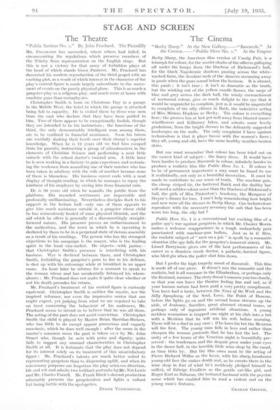The Cinema
"Becky Sharp." At the New Gallery.—" Barcarole." At the Curzon. "Public Hero No. r." At the Empire Becky Sharp, the American film version of Vanity Pair, is a triumph for colour, for the scarlet cloaks of the officers galloping off under the lamps from the Duchess of Richmond's ball, for the black Napoleonic shadows passing across the white- washed farm, the desolate rush of the dancers streaming away in pania when the guns sound below the horizon. It is absurd, this panic ; it isn't true ; it isn't as dramatic as the truth, but the winking out of the yellow candle flames, the surge of blue and grey across the dark hall, the windy encroachment of nocturnal colour, give so much delight to the eye that it would be ungrateful to complain, just as it would be ungrateful to complain of the silly climax in Bath, the indecisive acting of Miss Miriam Hopkins as Becky. The colour is everything here ; the process has at last got well away from blurred mauve windflowers and Killarney lakes, and admits some lovely gradations, from the bright dresses to the delicately suggested landscapes on the walls. The only complaint I have against technicolour is that it plays havoc with the women's faces ; they all, young and old, have the same healthy weather-beaten skins.
But one must remember that colour has been tried out on the easiest kind of subject : the fancy dress. It would have been harder to produce Barcarole in colour, infinitely harder to produce a realistic film like Public Hero No. 1. If colour is to be of permanent importance a way must be found to use it realistically, not only as a beautiful decoration. It must be made to contribute to our sense of truth. The machine gun, the cheap striped tie, the battered Buick and the shabby bar will need a subtler colour sense than the Duchess of Richmond's ball, the girls of Miss Pinkerton's Academy, the Marquess of Stcyne's dinner for two. I can't help remembering how bright and new were all the dresses in Becky Sharp. Can technicolour reproduce with the necessary accuracy the suit that has been worn too long, the oily hat ?
Public Hero No. 1 is a conventional but exciting film of a police spy's war against gangsters in which Mr. Chester Morris makes a welcome reappearance in a tough melancholy part punctuated with machine-gun bullets. Just as in G Men, the realistic subject of" men on a job " is spoilt by a romantic situation (the spy falls for the gangster's, innocent sister). Mr. Lionel Barrymore gives one of the best performances of his career as a drunken crook doctor, a pathetic, farcical figure, who bled gin when the police shot him down.
But I prefer the high tragedy mood of Barcarole. This film is made all of one piece. It doesn't mix the romantic and the realistic, but is all romance in the Elizabethan, or perhaps only the Rostand, manner. The story doesn't concern you too closely, so that you can leave the theatre feeling, fine and sad, as if your human nature had been paid a very pretty compliment. You have had a taste, between the News of the ,Week and the Silly Symphony, of the Soul, Love, the Point of Honour, before the lights go, on and the second house streams up the aisle, of Jealousy, Sacrifice, great abstract eternal issues, or perhaps only of ingenious artificial situations. A young reckless womaniser is trapped one night at his club into a bet with a Mexican that he will win his wife before morning. There will be a duel in any case : if he loses his bet the Mexican will fire first. The young man falls in love and rather than cheapen the woman pretends that he has lost the bet. The unity of a few hours of the Venetian night is beautifully pre- served : the tenderness and the despair grow under your eyes in the dance hall, in the horrible little wine-shop by the canal, as time ticks by. But the film owes most to the acting of Pierre Richard Willm as the lover, with his sharp, handsome young-old face (he makes death real, as he sweats there in the wine shop in fear of what he's recklessly pledged himself to suffer), of Edwige Feuillere as the gentle cat-like girl, and Roger Karl as Zubaran, the tortured husband with the psychic sense which has enabled him to read a violent end on the young man's features.
GRAHAM GREENE.


























































 Previous page
Previous page